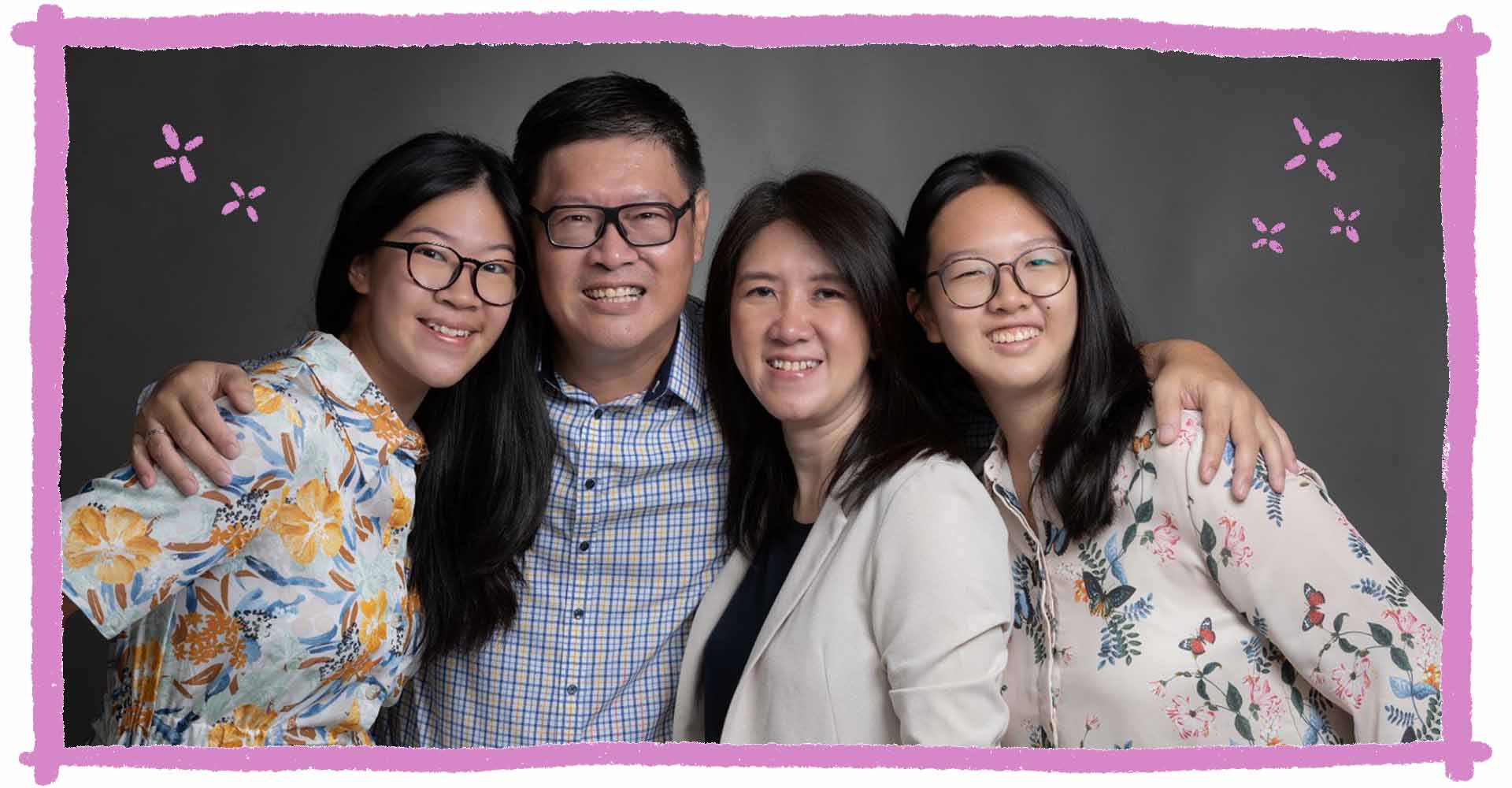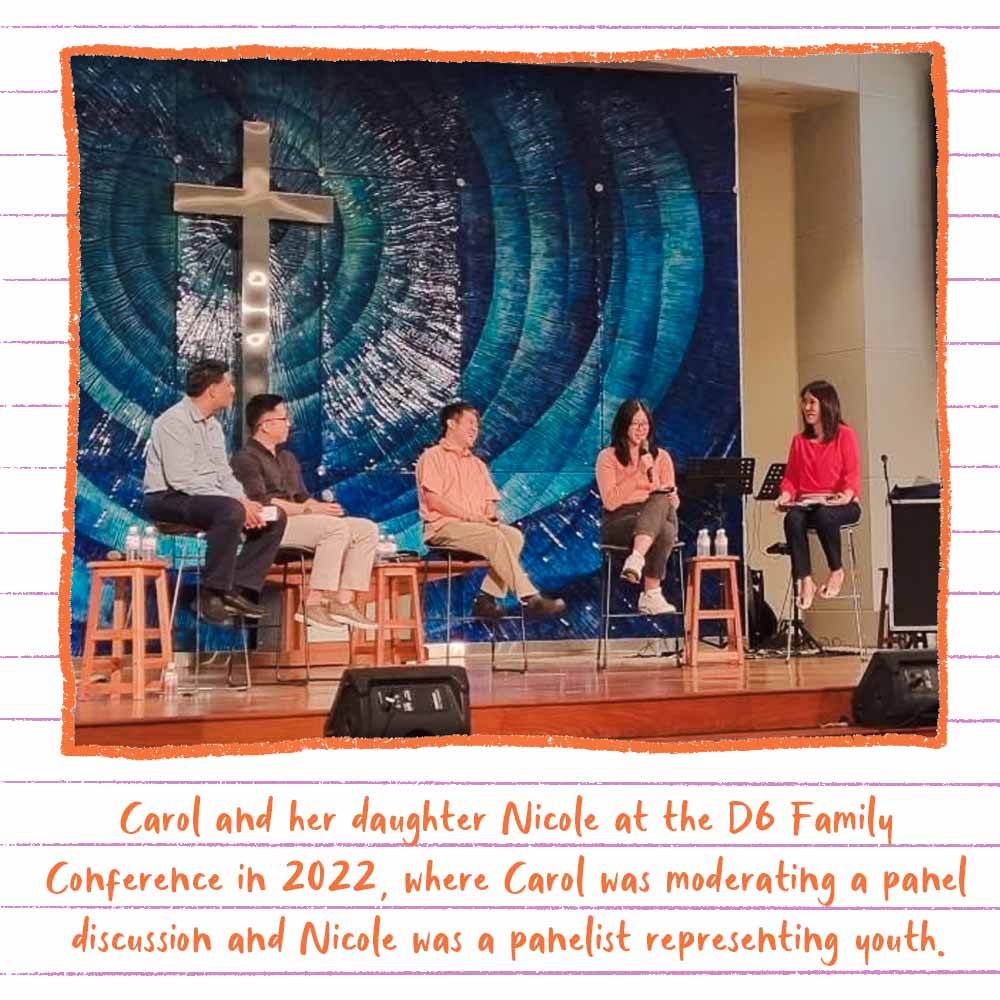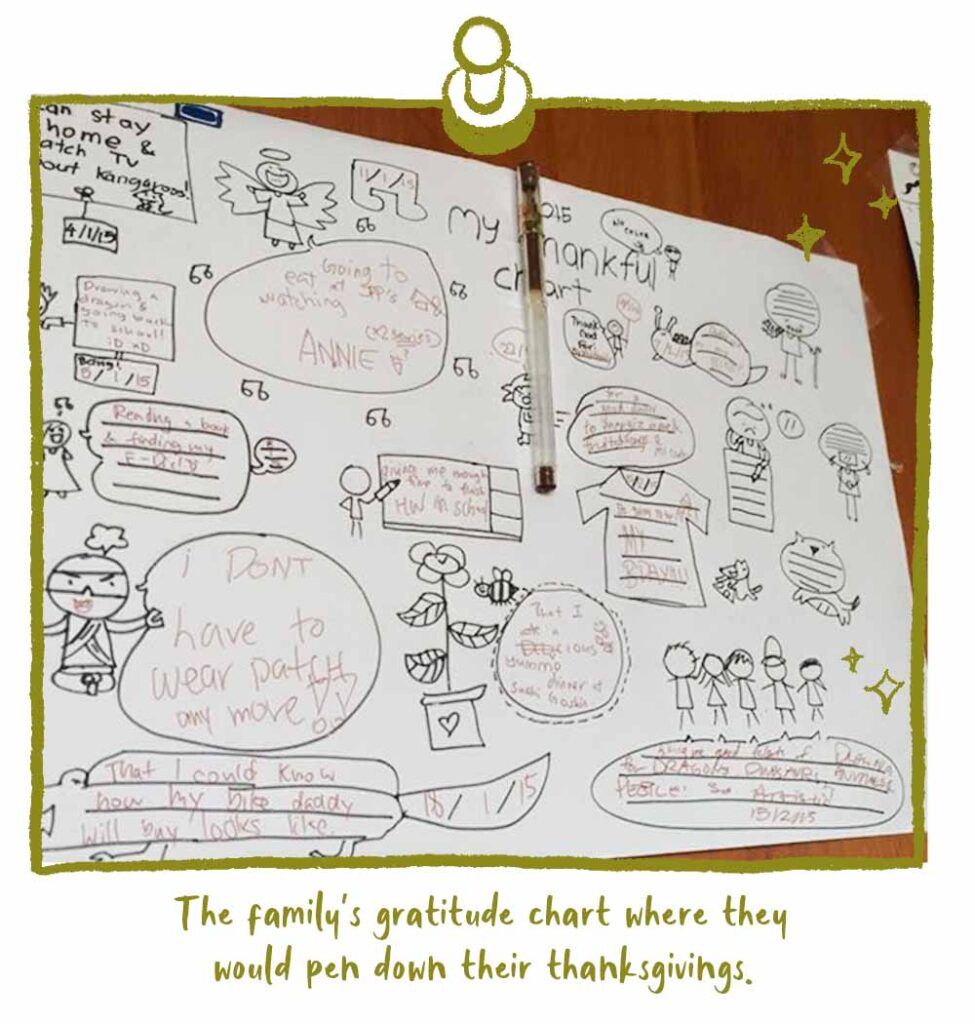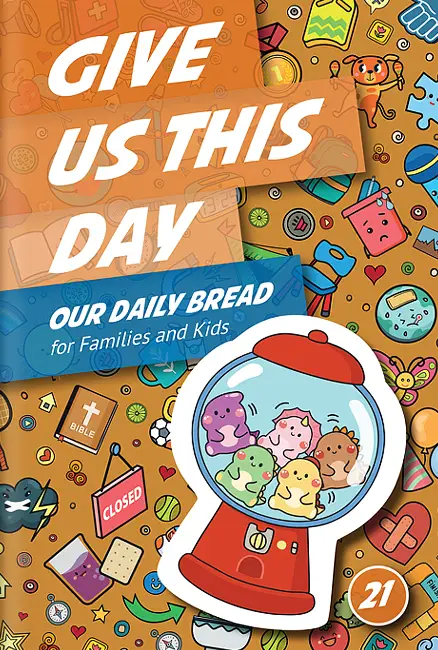
Carol Loi is a familiar face in some local Christian parenting circles. The mother of two wears various hats as parent coach, digital wellness educator, and a leadership and communications trainer.
In recent years, she has facilitated many popular talks and webinars for Christian parents on topics ranging from sexuality education to screen time. Her elder daughter, Nicole, also speaks at some of these events.
To many, Carol appears to be a veteran parenting expert, as she dishes out tips and advice on different parenting challenges. Her chemistry with 21-year-old Nicole is also evident in the sessions they facilitate together.

Yet, all these would have been unimaginable 20 years ago—when Carol was still a self-declared agnostic married to an unbeliever.
Give Us This Day 21
Get our latest family devotional!
Our latest devotional, Give Us This Day 21, is now available.
Get a Copy
Every month, we roll out a new resource for families. Subscribe to our email updates, and be the first to get a copy!
‘No Need for God’
Born into a Christian family, Carol studied in a mission primary school and attended church dutifully as a child. But after enrolling in a secular secondary school, the understanding she had of her faith began to unravel.
“I was a very rebellious and strong-willed daughter who broke my parents’ heart. They just prayed for me over the years.”
“I realised that some people didn’t seem to need God,” she says. “And that got me thinking: ‘Why do I need God? Other people can be morally upright, too.’”
That was when she decided to drop out of church. “I was a very rebellious and strong-willed daughter who broke my parents’ heart,” she admits. Once, she refused to get out of the car after arriving at church. But her parents never lectured or forced her to continue attending church. “They just prayed for me over the years.”
“As an agnostic or atheist—at the time I didn’t even know what to call myself—I just knew that it didn’t matter,” says Carol. “If people want to believe what they want to, that’s fine. Just don’t tell me that I’m lost. I used to argue with Christians who tried to reach out to me.”
After all, she was perfectly happy and healthy, with a boyfriend and a good job. There was no need for God.
Finding Solid Footing
Upon getting married, Carol would dutifully follow her husband Albert around as he went about his religious rituals and customs. He would wear an amulet and had idols in the house, which he prayed to. “He said it was good for the family, and I didn’t have anything against it then,” she recalls.
However, things took a turn when she was pregnant with her second daughter, Gillian. “I realised that it was getting harder and harder to raise my kids. When it came to the basis for what was right and wrong, there were no black and white answers I could teach them,” says Carol.
“I myself didn’t have any reason or purpose for knowing why something was right or wrong. Like why was it that we could do or say or watch some things, but not others? I didn’t know.”
She began to contemplate the fundamentals of her childhood faith and the “clear guardrails” it provided on issues of morality. Just as she was doing so, her cousin invited her and her elder daughter Nicole to join the children’s programme in her church.
She agreed, and eventually returned to Christ. Albert also joined the church’s business group, which met in town weekly. As he learnt more about the faith, he, too, accepted Christ three years later.
“God Ministers through Us Parents”
As Nicole and Gillian grew up, Carol and Albert sought to impart their faith to their daughters in different ways. They would have family devotions over breakfast, using age-appropriate resources with their girls. “One book we used had question prompters to get readers to think a little more about what they would do in different situations,” Carol remembers. “The kids found it very interesting because it was so situational.”
Every night, the family would write down one thing they were thankful for on their “gratitude chart”, which was “basically a sheet of drawing paper,” Carol laughs. “I think that helps to build the habit of gratitude, so we see the world in a different way and we don’t take things for granted.”
“God, I don’t know what’s going to happen to them this day. I know that they are Yours, and You are with them. I can only do what I need to do for You and for my children.”

Carol would also pray for her daughters twice a day: before she sent them off to school in the morning, and when she put them to bed at night. “Sometimes when I’m praying for them, I can feel their tension just melting away,” she says. “I think it’s so important and precious that God ministers through us parents to impart to our young people His shalom peace—whether through praying for them or teaching them God’s Word.”
These days, she still prays for Nicole and Gillian, who are 21 and 18 respectively. “Now that my daughters are older, when they go out I will pray: ‘God, I don’t know what’s going to happen to them this day. I know that they are Yours, and You are with them. I can only do what I need to do for You and for my children,’” she says. “This helps me not to worry, remembering that they are ultimately God’s children, and He will take care of them.”
Tackling Tough Questions
When Nicole and Gillian entered secondary school, they began to ask questions about the faith—just like Carol did at their age. “‘Is God real? How do you know He created the earth? What about the big bang theory? Are dinosaurs real?’” Carol recalls.
While such questions might raise some parents’ eyebrows, Carol took them all in her stride. “They were interesting questions actually,” she remarks. “And they led us into this process of us figuring out our faith together. In a way, I ‘lost’ 20 years of my faith when I backslid, so I wanted to figure out the answers for myself, too.”
“Our children are growing up in an age when they have so many different influences. I didn’t want my children to just parrot, ‘The Bible says so,’ without being grounded and convicted by what the Bible actually says.”
She embarked on a search for answers, signing up for online classes, watching videos and talks, and reading books and online sources. She would then share with her daughters what she had discovered, and introduce helpful resources to them. Occasionally, she would also bring them along to attend talks by apologists.
Says Carol: “Our children are growing up in an age when they have so many different influences. I didn’t want my children to just parrot, ‘The Bible says so,’ without having a mind of their own, and without being grounded and convicted by what the Bible actually says.”
“When our children understand that the Bible can explain the reality of this world, they can then know that it is a reliable source of how they should live life,” she adds. Citing 2 Corinthians 5:20, she says: “As ambassadors for Christ, we are to represent Christ and our citizenship in heaven through Him. This means that we should understand the kingdom we’re representing—otherwise, how can we represent Him well?”
To Carol, tackling the big questions of the faith is a vital responsibility that should not be merely left to the church or school. “As a Christian, I believe it’s my responsibility to know the truth, and as a mother, it’s my responsibility to teach it to my children,” she says. “At the end of the day, we are raising souls for eternity.”
“It’s not just about ‘How do we teach our kids?’, but ‘Do we have the right mentality to learn for ourselves?’” she continues. “Of course, we shouldn’t expect to know everything. But the more we learn, the more we will think, ‘How amazing is our God!’”
“As a Christian, I believe it’s my responsibility to know the truth, and as a mother, it’s my responsibility to teach it to my children. At the end of the day, we are raising souls for eternity.”
And, she adds, when parents have a sense of awe and curiosity about knowing God and His creation, it can spread to their children, too. One way parents can do this, she suggests, is to learn bite-sized facts or information that they can share with their kids, or listen to testimonies and apologetics podcasts while doing chores. Joining Christian communities and learning from other parents’ examples is also a good way to start, she adds.
Bonding as a Family
Aside from seeking to impart the faith to her daughters, Carol also tries to spend one-on-one time with them. When the girls started primary school, Carol created a tradition called ‘Nicole Day’ and ‘Gillian Day’, when each daughter could plan the day to do whatever she wanted with her parents.
Says Carol: “We wanted to send the message to our daughters that they’re important, which was especially meaningful as both of their love languages are quality time.” This in turn strengthened their relationships with their girls, to a point where they could feel comfortable talking with them about important—and sensitive—issues.
When both daughters turned 12, Carol and Albert took each of them on a weekend getaway, during which they used a Christian sexuality education resource to discuss topics such as dating, intimacy, and romantic relationships. “Before they went to secondary school, we prepared and envisioned with them the goals and boundaries of dating, so that they already knew what to expect even before they entered their teenage years,” she says.
The family also has a tradition of going on an annual retreat to bond and share feedback about each other. “It’s interesting to see what my daughters write, like ‘Don’t get too close to my friends,’” she laughs. “It can be helpful to hear my kids’ perspectives. The question for us is: Are we brave enough to hear what they say?”
“Don’t give up or feel disheartened when they roll their eyes at you. At some point, they will appreciate you. They may not say it out of pride, they do want someone to affirm and pay attention to them.”
During each retreat, the family takes time to discuss plans for the coming year and share how they can pray for and support each other. It is also a time for Carol and Albert to help their daughters process their feelings about various issues.
While some might say that teenagers should become more independent at this age, Carol finds that the opposite holds true. “Teenagers need their parents to process with them the complexities of life, so that they don’t just turn to their friends, the internet, or a chatbot for answers. As parents, we can and should be an authority figure who can help, support, and pray for them.”
Of course, not all teens may want to spend time with or share things with their parents. Carol encourages parents to persevere in building their relationship with their teens. “Don’t give up or feel disheartened when they roll their eyes at you,” says Carol. “At some point, they will appreciate you. They may not say it out of pride, but actually, they do want someone to affirm and pay attention to them.”
Handling Sexuality Talks, Social Media, Sleepovers
One issue that the family has discussed is the usage of social media. When her daughters were in primary school, Carol would co-create Facebook posts with them, using her own Facebook account. This meant vetting their posts before their upload, to ensure that their photos and captions were appropriate. This helped her daughters to learn the skill of posting things online intentionally, she says.
When her daughters turned 13 and asked to have their own Facebook accounts, Carol went through a list of criteria with them, which included: “Are you responsible for your things?”, “Are you making good choices?”, and “Are you talking to Daddy and Mummy respectfully?”
“I made clear the criteria for having their own account, and explained why they were important,” shares Carol. Upon meeting the criteria, they created the Facebook accounts together as a family.
They also drafted a family media plan, which included being friends with each other on social media accounts, and being accountable to each other online. “We tell them that just as we want them to be safe in the physical world, we want them to be safe in the online world,” says Carol. “It’s not about being overbearing, but being mutually transparent and accountable.”
“It’s about helping them understand why these family boundaries exist, and what they’re based on.”
Of course, there have been times when her daughters would question certain rules, such as on sleepovers. Carol would then gently point them back to the principle of wanting them to be safe that lay behind the boundaries and rules. These included holding sleepovers only in their own home and visiting friends’ homes to study in groups rather than going solo, especially if no adults were present.
At the same time, Carol and Albert allow for some negotiation of these boundaries. “I will tell them, ‘It’s Daddy and Mummy’s responsibility to care for you. We trust you but we don’t know your friends yet, so let us get to know them first. Help us to make it easier to trust them.’ It’s about helping them understand why these family boundaries exist, and what they’re based on,” she adds.
Parental Dreams, Duties, and Devotion to God
Her experience as a parent has taught Carol one thing: much of the parenting journey has to do with managing expectations.
When she was still a new mother working for a government ministry, Carol had to give up an opportunity to go on a work trip to Sweden along with her colleagues, as she was still nursing Nicole. When her girls grew up, she decided to leave the public service—after seeing them fall asleep at her office canteen whilst waiting for her to finish her work.
“I felt very guilty then, watching them wait for me,” she shares. “It was difficult stepping out of the public service and doing my own thing, but I’m glad I did, because now I can be around for them during their teen years, when the presence of a caring adult is all the more important.”

Since then, Carol has set up her own social enterprise, Village Consultancy, where she leads workshops on family-related issues such as digital wellness, sexuality education, and mental toughness.
Looking back, Carol confesses feeling frustrated and constrained as a young mum, when she wanted to do a lot of things but was not able to. “My perspective changed when I heard someone share that there’s a season for everything (Ecclesiastes 3:1–8), and that there may be certain dreams that are meant for another season.”
“How do I define progression? Is it by looking at how I’m serving God, and doing what He’s calling me to do?”
Over time, she has learnt to be comfortable and content in whatever season she finds herself in, and with whatever decisions she has made. “Now that my girls are older, I can do a lot of things that I wanted to do at that time—not just in terms of work and ministry—but also in terms of having flexibility in spending time with my family,” says Carol.
“Of course, my pay is definitely not as much as before, and there isn’t the same job security or career progression,” she shares. “But I’ve learnt to ask myself: How do I define progression? Is it by looking at how I’m serving God, and doing what He’s calling me to do?”
One passage that strengthens her as a parent is Psalm 23. “It may be a common refrain, but it’s so comforting knowing that the Lord is our shepherd, who makes us lie down in green pastures and leads us beside quiet waters (Psalm 23:1–2). It’s especially so for mums like myself, who are usually very busy,” she laughs.
Because of this, Carol feels it is all the more important that parents stay close to God. “Sometimes, kids can all too easily distract us from our walk with God—but we still think that we’re serving Him in our distraction. It can be so easy to focus on our kids or career, but let us first build our relationship with God and not waver from it.”
“As we do so, we have an opportunity to be role models for our children, who can grow up in a home that has a solid grounding in Christ.”




